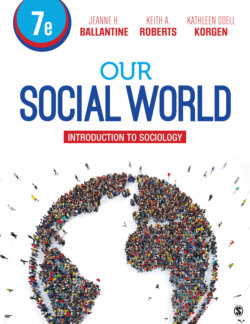Читать книгу Our Social World - Kathleen Odell Korgen - Страница 30
На сайте Литреса книга снята с продажи.
What Is Sociology?
ОглавлениеSociology is the scientific study of social life, social change, and social causes and consequences of human behavior. Sociologists examine how society both shapes and is shaped by individuals, small groups of people, organizations, national societies, and global social networks. For you this means learning how what you do affects other people—and how they affect your life.
Unlike the discipline of psychology, which focuses on the attributes, motivations, and behaviors of individuals, sociology focuses on group patterns. Whereas a psychologist might try to explain behavior by examining the personality traits of individuals, a sociologist would examine the positions or tasks of different people within the group and how these positions influence what individuals think and do. Sociologists seek to analyze and explain why people interact with others and belong to groups, how groups like the family or you and your friends work together, why some groups have more power than other groups, how decisions in groups are made, and how groups deal with conflict and change. Sociologists also examine the causes of social problems, such as delinquency, child abuse, crime, poverty, and war, and ways they can be addressed.
▲ Here children experience ordered interaction in the competitive environment of a soccer game. What values, skills, attitudes, and assumptions about life and social interaction do you think these kids are learning?
© Moodboard/Cultura/Getty Images
Two-person interactions—dyads—are the smallest units studied by sociologists. Examples of dyads include roommates discussing their classes, a professor and student going over an assignment, a husband and wife negotiating their budget, and two children playing. Next in size are small groups consisting of three or more interacting people who know each other—a family, a neighborhood or peer group, a classroom, a work group, or a street gang. Then come increasingly larger groups—organizations such as sports or scouting clubs, neighborhood associations, and local religious congregations. Among the largest groups contained within nations are ethnic groups and national organizations or institutions, such as Google or Facebook, the Republican and Democratic national political parties, and national religious organizations like the Southern Baptists. Nations themselves are still larger and can sometimes involve hundreds of millions of people. In the past several decades, social scientists have increasingly focused on globalization, the process by which the entire world is becoming a single interdependent entity. Of particular interest to sociologists is how these various groups are organized, how they function, how they influence one another, and why they can come into conflict.
Thinking Sociologically
Identify several dyads, small groups, and large organizations to which you belong. Did you choose to belong, or were you born into membership in these groups? How does each group influence who you are and the decisions you make? How do you influence each of the groups?
